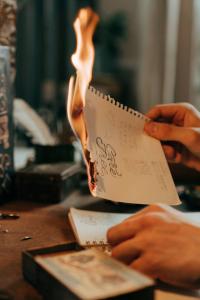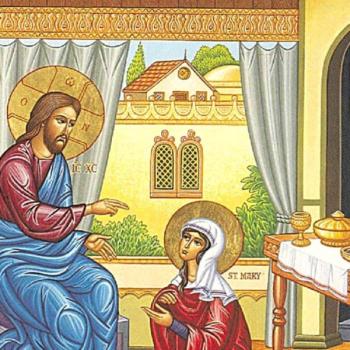Witchcraft is a hot topic in most Christian circles. A short survey of any social media site will show curious onlookers the complicated beliefs and concepts people have about what witchcraft is and how it affects the life of the believer. Some people think it has no effect whatsoever, some think it has a moderate impact, and others believe it has such a great impact, there is no way
a believer can survive in a situation where witchcraft is present.
An overemphasis on witchcraft (as well as much misunderstanding most have about it) comes from the “entertainment factor” present in many deliverance ministries. The more dramatic a story someone tells, the more readily people swallow it, even if much of it is a total or partial lie. We’ve turned deliverance, witchcraft, possession, and even warfare into a drama, parallel to any soap opera that entertains us on television.
What should we know about witchcraft – and should we be afraid?

A basic summary of witchcraft
In my book, Understanding Demonology, Spiritual Warfare, Healing and Deliverance: A Manual for the Christian Minister, I define witchcraft as: “…the practice of magic…the entire study, application, and use of it in an individual’s life.” Its goal is, as is clarified in Scripture, to take or obtain control of one’s life, operating and manipulating different natural elements for the end goal of working the spiritual realm. In the simplest sense, it is a form of control.
There are different ways witchcraft works, but at its root, it relates strongly to spiritual systems tied to idolatry. In the effort to produce results, one forsakes the patience of faith, and tries to make things happen on their own.
Some are very preoccupied with witchcraft as is understood through paganism or spellcasting. Others focus on its means through Satanism, or representations of witchcraft in popular culture, such as through Disney movies or the Harry Potter series. I would also argue that there are plenty of people who profess various forms of faith who exert their will through power and control, whether it’s through attempting to run the church from the pew, praying or “declaring” someone will conform to their desired will (falling in love, marriage, conception without a spouse’s consent, getting others to do what they want, etc.). Such isn’t any less witchcraft, and definitely to be of note in spiritual discernment.
Taking a step back
Whether or not we take it seriously, witchcraft is a real thing, practiced in many ways by real people. Deliverance ministry, which exists to help set people free from spiritual bondage, shouldn’t be an entertainment platform. Likewise, understanding witchcraft and the way spirits influence and often control our lives is not entertaining. They do not exist for our personal fodder or to make for good television programs. While the magic of elements is often fascinating to children and adults alike for fictional stories, those stories don’t exist to handle the realities of witchcraft. Such are real and prevalent in our lives, often in ways we do not understand.
Every single human being has spirits of one form or another “around” them. We would call these “familiar spirits,” beings that seek to cause confusion and trouble in our lives. We can either allow these spirits to have sway over the little things we do and the ways in which we treat others, or we can choose to follow God and do things the way He would have us do them.
It doesn’t begin and end with that declaration, however. Familiar spirits are called such for a reason – they know about us, what makes us tick, the hurts and pains that we have incurred in our lives, and the different ways in which we are easily tempted, scorned, hurt, or offended. These spirits work in various ways to get our attention and influence our behavior as they play upon our
emotions, temptations, and states of thought and feeling in order to get us to behave in a carnal, or “fleshly” manner. Familiar spirits operate to get sway over us and introduce us to spirits that are
more difficult to overcome and break in our lives.
Caution in who we trust
There are as many forms of witchcraft as we can find forms of power and control. We must be, therefore, very careful who we trust. We’re quick to believe that witchcraft only takes on obvious, larger-than-life forms, but this is simply not true. Witchcraft does not just operate via big-name spirits, such as Leviathan or Beelzebub. Most of the time, witchcraft effects people through the realm of familiar spirits, through those little decisions, choices, and feelings that influence us on a daily basis and suddenly lead us into states of being, thoughts, concepts, and ideas that we
would ordinarily not even give a second thought to.
Examining witchcraft in ourselves
We also must realize that we can make anything sound good and “holy” if we try hard enough. We can make our own scorn, hurt, dislike for correction, or disdain to be any array of divine missions, if we try hard enough. It’s very easy to try and exert witchcraft (power and control) over people because we feel they have hurt our mission, stung us with correction we probably rightly
deserved, don’t acknowledge us in the way we desire to be acknowledged, or somehow hurt our feelings. It’s important to be spiritual enough to step back and be honest about our situations
and the healing we need instead of trying to fire back “super spiritual statements” disguised as divine warnings.
None of us, no matter how anointed or purposed we may be, are above the influences of witchcraft and above operating in such behavior if we don’t “check ourselves before we wreck ourselves.” Every Christian should understand how spirits operate and influence us, recognize signs within ourselves, and have enough discernment to recognize when someone else is working a little controlling magic against us.














